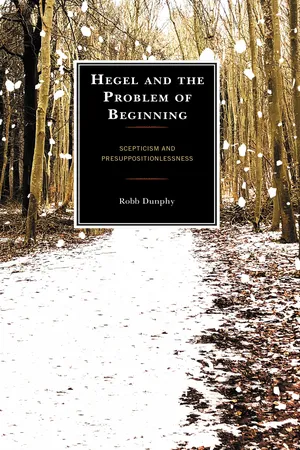
- English
- ePUB (mobile friendly)
- Available on iOS & Android
eBook - ePub
About this book
Hegel opens the first book of his Science of Logic with the statement of a problem: "The beginning of philosophy must be either something mediated or something immediate, and it is easy to show that it can be neither the one nor the other, so either way of beginning finds its rebuttal." Despite its significant placement, exactly what Hegel means in his expression of this problem and exactly what his solution to it is, remain unclear.
In this book, Robb Dunphy provides a detailed engagement with Hegel's "problem of beginning", locating it within Hegel's account of significant approaches to the topic of beginning in the history of Western philosophy, as well as making an extended case for the influence of Pyrrhonian Scepticism on the beginning of Hegel's Logic. Dunphy's discussion of the various putative solutions that Hegel might be thought to put forward contributes to debates concerning Hegel's views on the methodology of logic, the relation between his Logic and his Phenomenology of Spirit, and differences between his Encyclopaedia presentation of logic and that of his greater Science of Logic.
Hegel and the Problem of Beginning also functions as a critical commentary on Hegel's essay, "With what must the beginning of the science be made?" which should be of interest to both researchers and students working on the opening of Hegel's Logic.
In this book, Robb Dunphy provides a detailed engagement with Hegel's "problem of beginning", locating it within Hegel's account of significant approaches to the topic of beginning in the history of Western philosophy, as well as making an extended case for the influence of Pyrrhonian Scepticism on the beginning of Hegel's Logic. Dunphy's discussion of the various putative solutions that Hegel might be thought to put forward contributes to debates concerning Hegel's views on the methodology of logic, the relation between his Logic and his Phenomenology of Spirit, and differences between his Encyclopaedia presentation of logic and that of his greater Science of Logic.
Hegel and the Problem of Beginning also functions as a critical commentary on Hegel's essay, "With what must the beginning of the science be made?" which should be of interest to both researchers and students working on the opening of Hegel's Logic.
Frequently asked questions
Yes, you can cancel anytime from the Subscription tab in your account settings on the Perlego website. Your subscription will stay active until the end of your current billing period. Learn how to cancel your subscription.
No, books cannot be downloaded as external files, such as PDFs, for use outside of Perlego. However, you can download books within the Perlego app for offline reading on mobile or tablet. Learn more here.
Perlego offers two plans: Essential and Complete
- Essential is ideal for learners and professionals who enjoy exploring a wide range of subjects. Access the Essential Library with 800,000+ trusted titles and best-sellers across business, personal growth, and the humanities. Includes unlimited reading time and Standard Read Aloud voice.
- Complete: Perfect for advanced learners and researchers needing full, unrestricted access. Unlock 1.4M+ books across hundreds of subjects, including academic and specialized titles. The Complete Plan also includes advanced features like Premium Read Aloud and Research Assistant.
We are an online textbook subscription service, where you can get access to an entire online library for less than the price of a single book per month. With over 1 million books across 1000+ topics, we’ve got you covered! Learn more here.
Look out for the read-aloud symbol on your next book to see if you can listen to it. The read-aloud tool reads text aloud for you, highlighting the text as it is being read. You can pause it, speed it up and slow it down. Learn more here.
Yes! You can use the Perlego app on both iOS or Android devices to read anytime, anywhere — even offline. Perfect for commutes or when you’re on the go.
Please note we cannot support devices running on iOS 13 and Android 7 or earlier. Learn more about using the app.
Please note we cannot support devices running on iOS 13 and Android 7 or earlier. Learn more about using the app.
Yes, you can access Hegel and the Problem of Beginning by Robb Dunphy in PDF and/or ePUB format, as well as other popular books in Philosophy & Idealism in Philosophy. We have over one million books available in our catalogue for you to explore.
Information
Table of contents
- Acknowledgements
- Abbreviations
- Introduction: “With What Must the Beginning of the Science be Made?”
- 1 Hegel and Pyrrhonian Scepticism
- 2 A Short History of the Problem of Beginning
- 3 The Problem of Beginning
- 4 Mediation I – Phenomenology
- 5 Mediation II – Completed Scepticism
- Bibliography
- About the Author